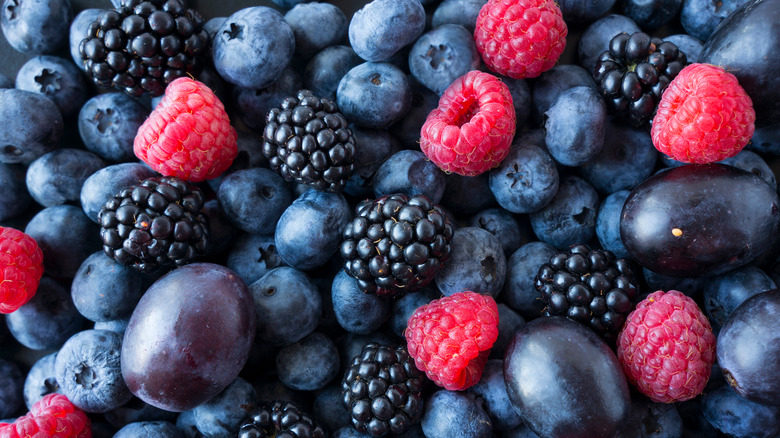Foods That Will Actually Lead To Firmer Skin
As we age, many of us notice a deterioration in the firmness of our skin. Scientific American explains the reason behind this phenomenon: a reduction in the production of collagen. Starting from the age of 20, our skin produces 1% less collagen with every passing year. This lack of collagen leads to thinner, more brittle qualities within the skin.
The Nutrition Source points out that collagen is the connective, fibrous-like tissue that is responsible for making all the tissues in our body more elastic and resistant, including our bones, tendons, cartilage, and skin. In addition to the natural aging process, collagen production can be affected by an array of environmental and external factors, such as drinking alcohol, smoking, excess exposure to the sun, and stress.
Nowadays, collagen supplements crowd the shelves as consumers seek their anti-aging properties. This is in part due to a growing body of research that supports the role of collagen in overall skin health, including this 2014 study published in Skin Pharmacology and Physiology that found that a group of women between the ages of 35 to 55 who ingested either 2.5 or 5 grams of collagen on a daily basis for two months experienced a noticeable improvement in skin elasticity.
In addition to supplement form, there are a number of collagen-rich foods that you can incorporate into your daily diet to experience the skin-firming effects of this family of proteins.
Eat these collagen-containing foods
MindBodyGreen outlines several foods that will give you the collagen boost you're looking for to support your skin's elasticity. Collagen can be found in both animal and plant foods, which provide a variety of options.
In terms of animal-based collagen foods, you'll want to look for bone broth and chicken (via MindBodyGreen). Registered dietitian Amy Gorin explains that chicken cartilage, in particular, is where you'll find the largest source of collagen. Fellow registered dietitian Andrea Mathis adds, "Bone broth ... contains a bioavailable form of collagen that your body can use right away."
For plant-based sources of collagen, you'll want to increase your intake of citrus fruits and berries, per MindBodyGreen. Citrus fruits contain a large amount of vitamin C, which is a crucial component of collagen production in the body. Berries also deliver a whopping dose of this vitamin –- just 1 cup will provide 50% of your daily needs. One more food to add to the list is nuts, as they are rich in zinc. Says Mathis, "... this essential mineral actually supports your fibroblasts, which are the cells that create the collagen."
Another way your body synthesizes collagen is from amino acids, which are found abundantly in egg whites and beans. Board-certified dermatologist Whitney Bowe explains, "Eggs ... contain a good amount of glycine and proline amino acids, which is what makes up collagen." In addition to amino acids, beans also contain copper, which is used in collagen production as well, notes Healthline.


